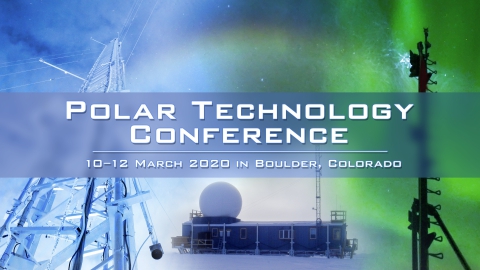
The Polar Technology Conference was held during 10–12 March 2020 in Boulder, Colorado. All conference products such as agenda, presentations, video recordings, and reports will be made available on this page. This activity was a cooperative effort among the National Science Foundation’s Office of Polar Programs (Award #OPP-01304316), the Arctic Research Consortium of the United States, and the polar research community.
Conference Report, Video Recordings, and Presentation Files Available
Polar Technology Products
Join the IARPC Collaborations Polar Technology Community Forum to participate in webinars and community discussion.
Poster Abstracts and Files
Agenda
The final, full meeting agenda with plenary presentation recordings and slides is available (updated 8 March).
Abstract Submission - Closed
Abstract submission closed on 7 February 2020, 5:00 p.m. Alaska time. Accepted abstracts are available on the Posters and Plenary Talks pages.
Registration - Closed
Meeting attendance has reached capacity, however, you can join us online. Please visit our Livestream page for more information.
Overview and Goals
Conference Background
The Polar Technology Conference (PTC) brings together polar scientists, technology developers, and field technicians from academia, state and federal agencies, the private sector, and non-governmental organizations. This interdisciplinary space provides an opportunity for technical and theoretical exchange on challenges impeding polar research and field operations. Community input is crucial to ensure that technological infrastructure investments are efficient, satisfy science drivers, and meet field requirements. The conference will address approaches to working and studying in the polar regions, including: terrestrial, marine, atmospheric, and social science disciplines; autonomous instrumentation; observation platforms; and all levels of logistical support.
View information on past meetings here.
This activity is being planned by a ten-member Organizing Committee as a cooperative effort between the National Science Foundation Office of Polar Programs, the Arctic Research Consortium of the United States, and the Polar research community. The conference is supported by the National Science Foundation (PLR-1304316).
Goal
The goal of the meeting is to link experts in polar science and technology development to discuss current technological resources for polar research and identify barriers to research and application of technology for problems unique to polar regions.
Objectives
The conference aims to:
1. Identify and define priorities using bottom-up community feedback to enhance polar science through technological advances;
2. Scope out areas where research and development (R&D) projects could deliver new technology to meet scientific or logistical user needs and identify where new technology would benefit from field trial;
3. Increase awareness of current funding calls appropriate for technical or R&D projects and provide input to funding agencies on effective support of technology-related projects for polar research; and
4. Build on past PTCs to create a community of practice for future dialogue between the users, manufacturers, and developers of technology used in polar research.
Expected Outcomes
The conference will produce a final report on the state of polar technology challenges and opportunities with a focus on short-term (1-5 years) and long-term (5-10+ years) community goals. Including:
- Cross-sector discussion about research or technology development priorities for both funding agencies and R&D activity, relevant funding opportunities, and scientific/logistical user needs.
- Increased awareness of cutting-edge polar technology capabilities in the research community, and formation of new collaboration opportunities between polar researchers and technology developers.
- Consensus benchmarks for measuring the impact of some technologies that are nascent or newly in practice.
Additional outputs could include:
- Summary article publication (e.g., AGU-EOS meeting report).
- Discussions with the polar community, including funders, researchers, developers, and technology users, about the value and outcomes of the conference via platforms such as social media, relevant newsletters, presentations, and media.
- Creation of a sub-group or collaboration team to advance connections and discussions initiated at the conference.
Conference Format
The format of the conference will consist of structured keynote speeches followed by related presentations with interspersed panel and poster sessions. Other alternative approaches for information delivery and sharing are also under consideration. Talks and posters will address the below listed science topics:
Topics
- Science Drivers: Key research needs and critical tools for improving observations and monitoring from multiple domains of polar science with an emphasis on system requirement
- Power Systems: Transmission, storage, alternative energy generation
- Instrumentation: Advances in instrumentation across all types of platforms and access
- Communications: satellites, data-transmission-limited environments, telemetry
- Data Access and Sharing: Technologies to access resources typical in more connected areas, such as information technologies, data in the cloud, distributed data resources, and processing technologies
- Overarching and Integrative Technology: large-scale projects that span multiple technologies including logistics and infrastructure projects
The National Science Foundation’s Office of Polar Programs also has a long-standing interest in capacity-building, training, international cooperation, leveraging existing resources/infrastructure, enhancing polar field operations, and engaging local and Indigenous Arctic residents and holders of Traditional Knowledge.
Contact Us
For any questions regarding the conference, please contact Lisa Sheffield Guy at lisa [at] arcus.org or 907-474-1600.
